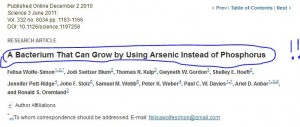
NASA Changes Biology Textbooks - Again
A press release posted on NASA’s website on Dec. 2 2010 says -
Get Your Biology Textbook…and an Eraser!
One of the basic assumptions about life on Earth may be due for a revision thanks to research supported by NASAs Astrobiology Program. Geomicrobiologist Felisa Wolfe-Simon has discovered a bacterium in Californias Mono Lake that uses arsenic instead of phosphorus in its DNA. Up until now, it was believed that all life required phosphorus as a fundamental piece of the backbone that holds DNA together. The discovery of an organism that thrives on otherwise poisonous arsenic broadens our thinking about the possibility of life on other planets, and begs a rewrite of biology textbooks by changing our understanding of how life is formed from its most basic elemental building blocks. Astrobiology Magazine has the story.
After reading the press release, we borrowed erasers from our kids and painstakingly removed all references to phosphorus from our biology text books.
Now it appears that the books need to be changed again, and this time back to their original form. Two new papers by Corky Marlinson and Rachel Sexton dispute NASA’s claim of reinventing biology.
A press release by Nature says -
Rosie Redfield, a microbiologist at the University of British Columbia in Vancouver, Canada, set about testing the finding. Earlier this year, she said that she could not reproduce Wolfe-Simons results in laboratory experiments (see Study challenges existence of arsenic-based life).
Redfield is now a co-author of one of two papers that confirm that, although the bacteria can tolerate arsenic, they do depend on phosphorus. The papers were published by Science on 8 July.
Wolfe-Simon, the author of original study, said in response - “There is nothing in the data of these new papers that contradicts our published data.” That response surely beats Bill Clinton’s “It depends on what the meaning of the word ‘is’ is.”, because Wolfe-Simon’s controversial statement sits right in her title -

We wish Dr. Wolfe-Simon success in her career as a California
scientist politician.